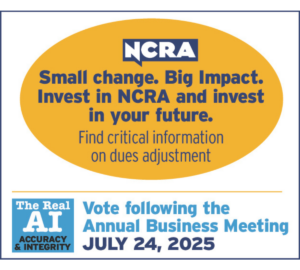By Kendra Steppler
James Gardner, RPR, a freelancer based in Vancouver, Wash., says what he loves most about his new career is that he does not suffer from the dreaded “imposter syndrome.”
“Of all the jobs I’ve held,” Gardner says, “I can say that I’ve never felt like less of an imposter than with court reporting.”
JCR | How did you get interested in court reporting?
JG | My mother was a court reporter for a large part of my childhood, so I got to see the ins and outs of how a reporter lives their life. I was always drawn to the flexibility of being able to do much of your work from home and on your own time. With English being one of my favorite subjects in school and having played musical instruments for a long time, I thought it would come somewhat naturally. Once I found out Mark Kislingbury’s school was down in Houston and that moving there was semi-affordable, I packed up pretty fast!
JCR | Who or what inspires you?
JG | Anybody who has their realtime certifications, the RMR/RDR, or competes in speed contests. It’s hard to imagine how anyone can write that well, but they show that it’s possible. The thought of getting there one day drives me to practice, clean up my dictionaries, keep an ear out for new words, and stay involved.
JCR | What’s something you’ve learned in your first few months of reporting?
JG | How much there is to learn! It’s a lot easier to be a reporter when you understand the intricacies of your software, the transcript ordering procedures in your state, the networking firms you’re likely to work with, the latest technologies that might make your job that much more streamlined, etc. Even just going to my state’s annual convention this September, I heard so many stories and experiences that might be helpful to have in my back pocket going forward. In this profession you can’t be too informed.
JCR | Where’s your favorite place to edit?
JG | It’s hard to beat my desk at home, especially when my cat’s not yelling too much. I’ve thought about going to a coffee shop or the library, but it’s just not as comfortable for me. I’m probably the fastest at editing, though, when we’re on a break and it’s a rush job.
JCR | Where do you see yourself and your career in five years?
JG | I’ve wrestled with the prospect of an officialship since my first few depos. It’s certainly a major advancement in almost every way, but the schedule I have now is hard to pass up. There are just so many great aspects of any path you choose to take as a stenographer that it can be difficult to parse out what’s really best for you. Whatever I decide, I’d like to eventually get my CRR so I have more options.
JCR | What is your next goal? What is a long-term goal?
JG | I do like how my career is shaping up for the moment, so the baseline goal is just to smoothly complete my first year of reporting and help out on my state association’s board. For longer-term ambitions, I want to snag any and all NCRA certifications that I can and settle into an officialship if I’m so inclined.
JCR | Do you have any advice for reporting students?
JG | Drill whatever briefs you can get your hands on, practice above your target speed, and seek out information about court reporting beyond just what you learn in your procedures class.
JCR | What’s something that you’ve learned in the field that you didn’t learn in school?
JG | That’s hard to answer since there were a lot of things I didn’t learn but knew about from having a reporter parent. For example, I wonder what my reaction to my first back order would have been if I didn’t always hear my mother groaning every time one came in for her. I’m constantly learning new words since school can’t prepare you for every medical or legal term you’ll hear. I work in a different state than I went to school in, so Oregon and Washington were two things I had to figure out for myself. I really can’t imagine a student coming out of school and knowing everything they need to know. I still don’t!
JCR | If you could sum up your first year in one word, what would it be and why?
JG | Great. Everything really has been great, from the relationship I’ve developed with my firm and my satisfaction with my work-life balance to my confidence in my ability to do the job well. I’m just happy with all of it and excited to stick with it going forward.
JCR | What do you know now that you wish you’d known when you first started out?
JG | How important it is to stay on top of the communication loop. As a reporter, you’re potentially interacting with a scheduling team, a production team, your direct manager, your scopist, your proofreader, and your clients, all of whom may pass through you for information. You can’t just assume scheduling knows everything production does or vice versa!
JCR | What do you enjoy most about court reporting?
JG | One term that came into the vernacular in the late 20th century is “imposter syndrome,” which is essentially the worry that you aren’t actually qualified to do your job. Of all the jobs I’ve held, I can say that I’ve never felt like less of an imposter than with court reporting. Even on my messiest writing day when I’m forgetting things left and right and it feels like my hands are moving through syrup, what matters most is the final transcript, and I’m confident that I can pull it together no matter what. I think that’s a big part of why reporting brings so little stress to my life.
Kendra Steppler, RPR, CRR, is an official in Eugene, Ore. She can be reached at kendrasteppler@gmail.com.
James Gardner, RPR, is a freelancer based in Vancouver, Wash. He can be reached at jamesgardner99@outlook.com.



